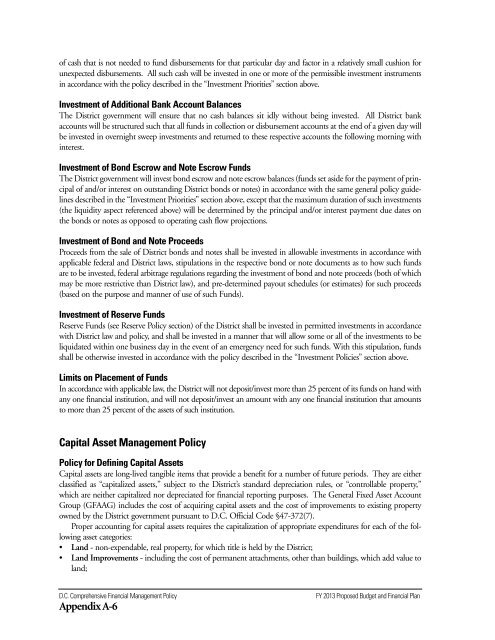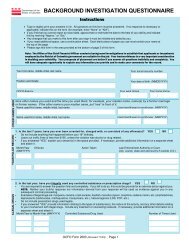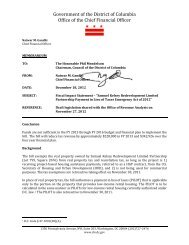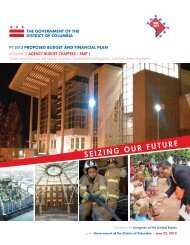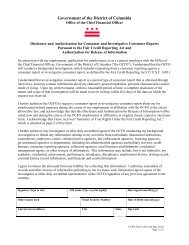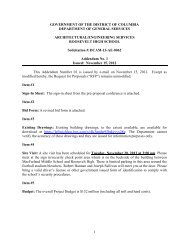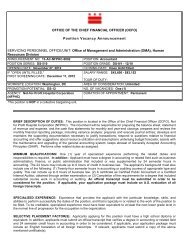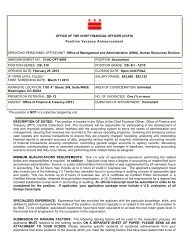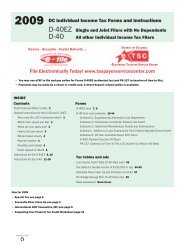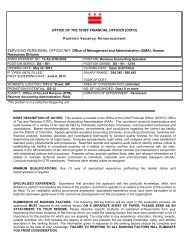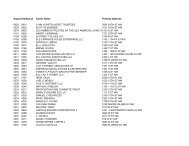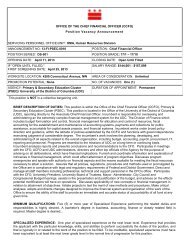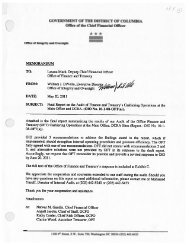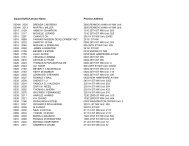Volume 1 - Executive Summary - Office of the Chief Financial Officer
Volume 1 - Executive Summary - Office of the Chief Financial Officer
Volume 1 - Executive Summary - Office of the Chief Financial Officer
You also want an ePaper? Increase the reach of your titles
YUMPU automatically turns print PDFs into web optimized ePapers that Google loves.
<strong>of</strong> cash that is not needed to fund disbursements for that particular day and factor in a relatively small cushion for<br />
unexpected disbursements. All such cash will be invested in one or more <strong>of</strong> <strong>the</strong> permissible investment instruments<br />
in accordance with <strong>the</strong> policy described in <strong>the</strong> “Investment Priorities” section above.<br />
Investment <strong>of</strong> Additional Bank Account Balances<br />
The District government will ensure that no cash balances sit idly without being invested. All District bank<br />
accounts will be structured such that all funds in collection or disbursement accounts at <strong>the</strong> end <strong>of</strong> a given day will<br />
be invested in overnight sweep investments and returned to <strong>the</strong>se respective accounts <strong>the</strong> following morning with<br />
interest.<br />
Investment <strong>of</strong> Bond Escrow and Note Escrow Funds<br />
The District government will invest bond escrow and note escrow balances (funds set aside for <strong>the</strong> payment <strong>of</strong> principal<br />
<strong>of</strong> and/or interest on outstanding District bonds or notes) in accordance with <strong>the</strong> same general policy guidelines<br />
described in <strong>the</strong> “Investment Priorities” section above, except that <strong>the</strong> maximum duration <strong>of</strong> such investments<br />
(<strong>the</strong> liquidity aspect referenced above) will be determined by <strong>the</strong> principal and/or interest payment due dates on<br />
<strong>the</strong> bonds or notes as opposed to operating cash flow projections.<br />
Investment <strong>of</strong> Bond and Note Proceeds<br />
Proceeds from <strong>the</strong> sale <strong>of</strong> District bonds and notes shall be invested in allowable investments in accordance with<br />
applicable federal and District laws, stipulations in <strong>the</strong> respective bond or note documents as to how such funds<br />
are to be invested, federal arbitrage regulations regarding <strong>the</strong> investment <strong>of</strong> bond and note proceeds (both <strong>of</strong> which<br />
may be more restrictive than District law), and pre-determined payout schedules (or estimates) for such proceeds<br />
(based on <strong>the</strong> purpose and manner <strong>of</strong> use <strong>of</strong> such Funds).<br />
Investment <strong>of</strong> Reserve Funds<br />
Reserve Funds (see Reserve Policy section) <strong>of</strong> <strong>the</strong> District shall be invested in permitted investments in accordance<br />
with District law and policy, and shall be invested in a manner that will allow some or all <strong>of</strong> <strong>the</strong> investments to be<br />
liquidated within one business day in <strong>the</strong> event <strong>of</strong> an emergency need for such funds. With this stipulation, funds<br />
shall be o<strong>the</strong>rwise invested in accordance with <strong>the</strong> policy described in <strong>the</strong> “Investment Policies” section above.<br />
Limits on Placement <strong>of</strong> Funds<br />
In accordance with applicable law, <strong>the</strong> District will not deposit/invest more than 25 percent <strong>of</strong> its funds on hand with<br />
any one financial institution, and will not deposit/invest an amount with any one financial institution that amounts<br />
to more than 25 percent <strong>of</strong> <strong>the</strong> assets <strong>of</strong> such institution.<br />
Capital Asset Management Policy<br />
Policy for Defining Capital Assets<br />
Capital assets are long-lived tangible items that provide a benefit for a number <strong>of</strong> future periods. They are ei<strong>the</strong>r<br />
classified as “capitalized assets,” subject to <strong>the</strong> District’s standard depreciation rules, or “controllable property,”<br />
which are nei<strong>the</strong>r capitalized nor depreciated for financial reporting purposes. The General Fixed Asset Account<br />
Group (GFAAG) includes <strong>the</strong> cost <strong>of</strong> acquiring capital assets and <strong>the</strong> cost <strong>of</strong> improvements to existing property<br />
owned by <strong>the</strong> District government pursuant to D.C. Official Code §47-372(7).<br />
Proper accounting for capital assets requires <strong>the</strong> capitalization <strong>of</strong> appropriate expenditures for each <strong>of</strong> <strong>the</strong> following<br />
asset categories:<br />
• Land - non-expendable, real property, for which title is held by <strong>the</strong> District;<br />
• Land Improvements - including <strong>the</strong> cost <strong>of</strong> permanent attachments, o<strong>the</strong>r than buildings, which add value to<br />
land;<br />
D.C. Comprehensive <strong>Financial</strong> Management Policy<br />
Appendix A-6<br />
FY 2013 Proposed Budget and <strong>Financial</strong> Plan


